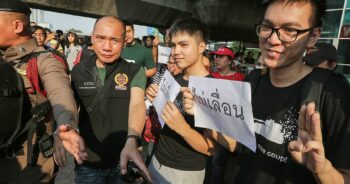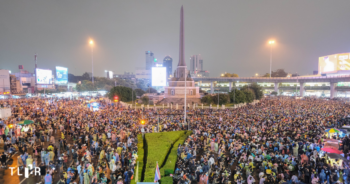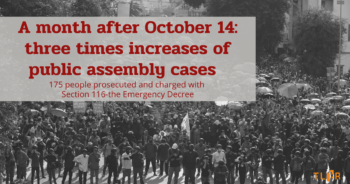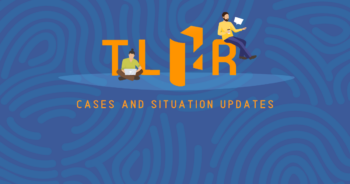Legal Observations on Head of the NCPO Order No. 22/2561
Thai Lawyers for Human Rights
On 11 December 2018, drawing on the power afforded to them by Article 44 of the 2014 (Interim) Constitution, the National Council for Peace and Order (NCPO) issued Head of the NCPO Order No. 22/2561 regarding the engagement of the people and political parties in political activities in the lead up to the election.
Thai Lawyers for Human Rights (TLHR) offers the following observations on the ongoing restriction of rights and liberties which remain despite this order. Text in italics of the details of the orders and announcements revoked is translated from Head of the NCPO Order No. 22/2561.
- Financial Transactions and Matters of Assets
Head of the NCPO Order No. 22/2561 nullifies NCPO Order No. 10/2557, which had halted the financial transactions and frozen the accounts of Mr. Chaturon Chaisaeng, but has not affected the case of Mr. Charupong Ruangsawan, who does not currently reside in Thailand. The order also nullifies NCPO Order No. 26/2557, which had halted the financial transactions of Mr. Sombat Boonngamanong and Police Sergeant Major Prasit Chaisrisa. All three (Chaturon, Sombat, and Prasit) had their assets frozen as they did not report themselves in line with NCPO orders.
- The Stipulation of Conditions and Prohibition of Political Activities
Section 1 (3): NCPO Announcement No. 39/2557 regarding the stipulation of conditions of those released following reporting to the NCPO
Section 1 (4): NCPO Announcement No. 40/2557 on the stipulation of conditions of those released who were detained according to Article 15 of the 1914 Martial Law Act
The aforementioned order nullifies the conditions of release, or the Memorandum of Understanding (MOU), of individuals who reported themselves and were detained according to the 1914 Martial Law Act. The conditions further prohibited those released from traveling outside the country without permission from the NCPO or supporting or participating in political demonstrations.
However, those taken into custody under Section 11 of Head of the NCPO Order No. 3/2558, promulgated after martial law was revoked on 1 April 2015, continue to have to follow the conditions of their release, as this section was not revoked. Head of the NCPO Order No. 22/2561 further stipulates that the nullification of the announcements and orders contained within it does not impact the prosecution of cases, proceedings or actions according to the announcements and orders which were carried out prior to the nullifications within it. There is ambiguity and a lack of clarity regarding whether or not cases of violation of conditions of release currently in process in the military court will be terminated. This creates a burden for defendants who must fight their cases to secure their freedom.
In addition, although the individuals who agreed to the conditions of release after reporting themselves to the NCPO are no longer bound by them or affected by NCPO Announcement No. 39/2557, those who did not report remain in violation of the law according to NCPO Announcement No. 41/2557 and are subject to prosecution in the military court.
- Offenses Related to the Prohibition of Political Demonstration and Assembly
Section 1 (7): Section 12 of Head of the NCPO Order No. 3/2558 regarding the maintenance of peace and order and national security
Section 2 … the nullification of the announcements and orders in 1 does not impact the prosecution of cases, proceedings or actions according to the announcements and orders which were carried out prior to the nullifications by this order.
Head of the NCPO Order No. 22/2561 has the effect of decriminalizing any political assembly or demonstration of 5 or more persons, which was criminalized in Section 12 of Head of the NCPO Order No. 3/2558. This means that the people and political parties are able to engage in political activities from 11 December 2018 onward.
However, Head of the NCPO Order No. 22/2561 stipulates that the nullification of the announcements and the orders contained within it does not impact the prosecution of cases, proceedings or actions according to the announcements and orders which were carried out prior to its promulgation. Ambiguity and a lack of clarity remain about whether or not the legal cases of political demonstration of 5 or more persons that violated Section 12 of Head of the NCPO Order No. 3/2558 that are currently at the stage of prosecution in both the military and civilian courts will cease. This creates a burden for defendants who must fight their cases to secure their freedom.
- Engagement in Political Activities
Throughout the regime of the NCPO, there have been a number of announcements and orders that prohibited political parties and the people from engaging in political activities. These announcements and orders have been nullified by Head of the NCPO Order No. 22/2561 as follows:
Section (5): NCPO Announcement No. 57/2557 regarding Section 2 of the Organic Act that prohibits existing political parties from holding meetings or other political activities and temporarily suspends proceedings to establish or register new political parties, as well as the allocation of funds to support political parties from the Political Party Development Fund.
Section (6): NCPO Order No. 80/2557 regarding individuals who must follow stipulated conditions which applies to 18 individuals involved in politics who are forbidden from traveling outside the kingdom and must refrain from all political activities and meetings. If they violate the aforementioned conditions and assist or support political activities, it will be held to be a violation or not acting in accordance with the conditions stipulated by NCPO Announcement No. 39/2557.
Section (8): Sections 4, 5, and 7 of NCPO Order No. 53/2560 regarding the proceeding according to the Organic Act on Political Parties which prohibits political parties from organizing large meetings, establishing provincial branch offices and representatives of the political party, organizing membership meetings or the membership engaging in other activities, and holding a meeting to submit a request to register the party except when permission has been granted by the NCPO.
Section (9): Section 6 of Head of the NCPO Order No. 13/2561 regarding the proceeding according to the Organic Act on Political Parties (Supplemental) which stipulates that those who hold positions within the parties may engage in public relations or contact and communicate with members using information technology or electronic media, but it may not be of a campaigning nature. The Election Commission and the NCPO may stipulate the characteristics or prohibit public relations or communication that may impact the peace and order of the people.
The Ambiguity of Head of NCPO Order No. 22/2561
Even though Head of the NCPO Order No. 22/2561 appears to nullify the criminality of violation of the conditions of release and the political assembly of 5 or more persons, the order stipulates that it does not impact the prosecution of cases, proceedings or actions according to the announcements and orders which were carried out prior to the nullifications made by it. This creates ambiguity of interpretation and is a burden for defendants undergoing prosecution who must fight for their freedom.
Thai Lawyers for Human Rights holds that Article 2 of the Criminal Code, which stipulates that there cannot be punishment without law (Cullum Crimen Nulla Poena Sene Lege), must be followed. The core of criminal law is contained within this article, which notes that “An act may only be punished if criminal liability had been established and penalty had been determined by the law which is in force at the time of the act. The penalty to be inflicted must be that which had been prescribed by such law.” In addition, the second clause of this article further notes that “If, according to the subsequent law, the act does not constitute an offence any further, the person having performed such act shall be relieved of the guilt. If a final judgment of conviction has already been rendered, it shall be taken that the convict has never been held guilty by such judgment. If he is incurring any penalty, his penalty shall come to an end.”
Therefore, as a result of the promulgation of Head of the NCPO Order No. 22/2561 and concomitant nullification of the crime of violation of the conditions of release and political assembly or demonstration of 5 or more persons, the court may be unable to cite the revoked orders and announcements in order to punish those who are being prosecuted for these crimes. In addition, it results in the suppression of the rights of defendants according to Article 39 (5) of the Criminal Procedure Code, which notes that “The right to institute a criminal prosecution is extinguished … by the coming into force of a law subsequent to the commission of the offence, abolishing such offence.”
The Power Still Retained by the NCPO
Even though the NCPO has relaxed their control of the peoples’ engagement in political activities in the lead up to the election, the view of TLHR is that the junta’s power to control and restrict the freedom of the people remains an important issue.
- The Head of the NCPO retains power according to Article 44 of the 2014 (Interim) Constitution and Article 265 of the 2017 Constitution. This aforementioned power will remain until a new cabinet takes office following the first general election according to the Constitution. This means that the Head of the NCPO will still have decisive power to issue orders to control and govern the country during the periods before, during and after the election. These orders are final, because they are without examination by the court, and are further legal and constitutional.
- Military officials who are peace and order maintenance officials following Head of the NCPO Order No. 3/2558 and protection and suppression officials following Head of the NCPO Order No. 13/2559 still retain the authority to arrest, search and seizure, and detain individuals for up to 7 days for “attitude adjustment.” This is a primary action that causes the people to be afraid to exercise their rights.
- The revocation of the offence of political assembly or demonstration of 5 or more persons under Head of the NCPO Order No. 3/2558, but with the stipulation that it does not impact ongoing cases, lacks clarity and causes individuals who are being prosecuted under this accusation to continue to have the burden to fight their cases in order to gain their freedom. In addition, NCPO Announcement No. 7/2557 that stipulates the same offence has not yet been revoked.
- The offence of violation of the order to report oneself according to NCPO Announcement No. 41/2557 remains in force. The prosecution of civilians in the military court in cases that arose between 25 May 2014 – 11 September 2016 also continues; existing cases were left unaffected by Head of the NCPO Order No. 55/2559 which ceased the initiation of new civilian cases in the military court on 11 September 2016. This may cause people to be unable to fully exercise their rights and freedom of expression.
In addition to the NCPO announcements and orders, the NCPO retains other instruments to limit freedom of expression through prosecution under Article 116 of the Criminal Code, the 2017 Computer Crimes Act, and the 2015 Public Assembly




